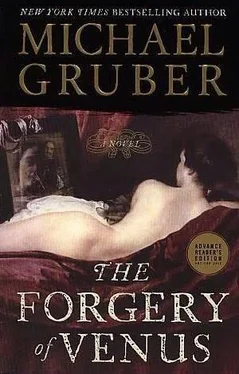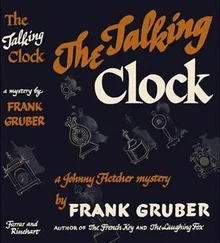I am a hidalgo, a son of someone, I am noble on both sides of my family, of pure Christian blood, and this thought is a constant undercurrent of all my thoughts, like my name, or my family’s history, or the positions of my limbs.
I finish the grinding and place the pigment carefully in a stoppered jar. I go into another room, where there is an elderly man staring at an uncompleted painting: my master, Old Herrera. I tell him I have finished grinding and say that if he has nothing else for me to do I would beg his leave to go out drawing in the plaza. He waves me away. He is no longer interested in me, because he knows I can already draw and paint better than he can himself and that I will not ever work for him so that he can profit from my skill.
I put on my hat and cloak and call out for my servant, Pablo. In a minute or so he comes out from the kitchen, smelling of smoke and grease. He is a boy a little older than me, dark skin, greasy black hair, wearing my cast-off clothes, which are too small for him. I feel a kind of affection for him, but also I feel that he is not really a person like I am, more like a superior kind of dog, or a donkey. I understand also that there are those, the grandees, who feel the same way about me, and this thought is like an intolerable itch. I wish to rise in the world.
I order Pablo to pick up the box and portfolio I use for drawing, and we go out, him following behind me at a suitable distance. We go to the plaza. It’s a market day and the stalls are full of tradesmen and women selling vegetables, fish, meat, leather, and household goods. I sit down on a keg of salted fish in the shade of a fishmonger’s awning. I open my box, set up my inkhorn, and point a reed pen with my pen-knife. I draw piles of fish, cockles, oysters, an octopus, the fishwife. Later I tell Pablo to adopt different postures and make faces, and I draw these too. The local people are used to me doing this, but often a stranger will pass and look at what I have drawn, and sometimes there will sound a soft oath from behind me. Sometimes a woman will cross herself. Many people find what I can do disturbing, it is too much like God, they think, to make things that look like life itself. But it is from God and the Virgin that I have this gift.
And I am painting the Virgin now, the first large painting I have been allowed to do, and I stop, my brush stutters, and I am struck with a memory from my days with Herrera, of grinding paint and then going out to draw in the market. It is very strange; I have not thought of him for two minutes since I became Don Pacheco’s student, and suddenly this burst of fresh memory. It has been nearly five years I’ve been with him, and this painting will be my masterpiece for entry into the painter’s guild of Seville. Of course it has to be a religious painting for that. The memory vanishes in a flash, like a street magician making a bowl of fruit disappear with a flourish of his cloth, and I shiver as if someone has walked on my grave.
I resume painting. The thing is not bad, better than anyone else in Seville can do, but not entirely satisfying. There is a stiffness in the figure that I don’t care for, but this is how it is done with Virgins, and she stands on a globe, which is unnatural to begin with, so perhaps the stiffness is part of what the good sisters at the Shod Carmelites expect. I’ve made her hair like that of Don Pacheco’s daughter. There have been hints this year that she would not be adverse to a proposal. I think it will happen. It’s important to have friends, and my master knows everyone who paints in Seville and even in Madrid, and he has connections with powerful people. A man he knows, Don Juan de Fonseca, has been chaplain to His Majesty. What could be more wonderful and full of honor than to wait upon the king himself!
I step back from the painting to examine the balance of the masses. More clouds on the left, I think. The face does not look too much like Juana de Miranda de Pacheco, that would be impious, but it is the same kind of face, and a real woman’s face too, not the doll face you see painted by the religious artists of Seville.
I load my brush with lead and lay in more clouds, blending the white into the ochre of the background. Already I am thinking of my next piece, a John the Evangelist for the same convent. Don Pacheco has written that John should be an old man, but I am going to paint him as a young fellow. I will use as a model a market porter of my own age, a man I’ve used before in my bodegones . I think the nuns will like to look at a young man. In any case in a short time I will be my own master and can paint what I like.
And now I have a strange feeling, the room is somehow too small, there is a tightness across my chest, I have to escape from my clothes, and a woman’s voice is calling out, “Relax, relax, it’s all right!” and I was struggling against my restraints as the room and the couch I was on seemed to toss around like a boat in a gale.
“It’s all right,” said Harris repeatedly, and after a while, “Are you okay now?”
“Drink,” I croaked. My throat was clawky with the taste of the drug and an intolerable dryness. I asked for water and she unwrapped my hand and gave me a plastic pint bottle, which I drank dry.
“How long was I out?”
She checked an electronic stopwatch. “Eighteen minutes. What happened?”
“Nothing. I was painting something.”
She untied me, gave me the usual clipboarded form, and asked,
“What were you painting?”
But now I found myself unwilling to share the details of my experience with these people. I mean really, they were trying to determine the effects of the drug on creativity, and I was perfectly willing to go on about that and fill out their tests and forms, but this stuff was really none of their business.
“It was just a painting, Harris,” I snapped. “What the fuck does it matter what it was? You can’t buy and sell it-it’s all in my head.”
“You’re feeling aggressive,” she said in that clinical tone.
“No, aggressive would be if I broke this goddamn clipboard over your head. And yeah, I’m being a pain in the ass because we artists are often a pain in the ass. If you wanted docile you should’ve brought in a bunch of kindergarten teachers. Now get out of here and let me finish this shit so I can go home!”
She flushed bright pink, started to say something, but turned and left the room. I finished the form and then I noticed that she’d left the tray full of little beakers with the gauze sponges in them, and there was a large covered jar on the tray with some code numbers on it. I opened it, and for some reason I pulled out a couple of the damp sponges and stripped out a latex glove from a dispenser and shoved them inside it. I don’t know why I did this; maybe it was Shelly saying he was going to cut my dosage. I didn’t like that. Something about being Velázquez was-I won’t say addictive, but compelling. I wanted more of it, not less.
I left the lab with the kitten-licking feeling under my skull more intense than before-maddening not to be able to scratch it-also hyped, energetic, like speed coming on, but without that jaw-grinding thing; I felt fine, spring in my step and all that. For a while after I got off the subway I wandered through Chinatown, drawing the markets, the piles of fish and fruits. I was trying to recapture the feeling I’d just had as the boy Velázquez and it was great, and when I got back to my loft I stretched a big canvas, over five by seven feet. I sized it with glue mixed with carbon black, and when it was dry I put on a thin layer of iron oxide, red lake, and carbon black, mixed with powdered limestone. Paint like Velázquez, prep like Velázquez. This took all day and into the evening. I was hungry, so I went out and got something in Chinatown and then came back and put on my lamps and stared at the vast thing for a while. I looked through my recent sketchbooks, but the ideas I thought I’d had seemed to have vanished. I kept feeling Lotte peering over my shoulder, expectant, ready to offer love again if I would just be true to the real Chaz. That or make a lot of money, I thought, hiding behind the cynicism.
Читать дальше












